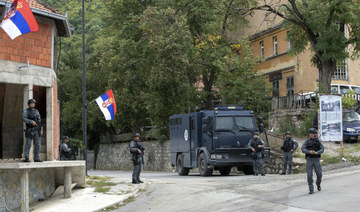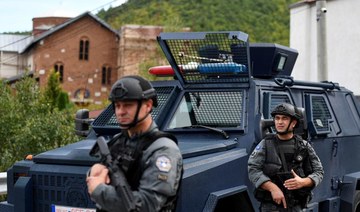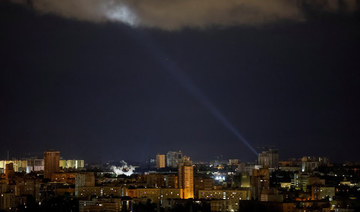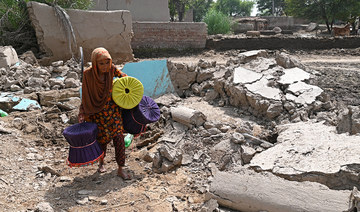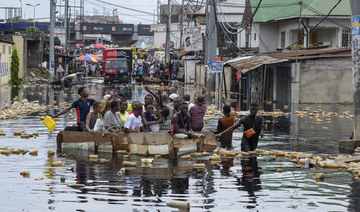PRISTINA: Prosecutors are seeking to restrict visits to three former Kosovo Liberation Army leaders who are on trial in The Hague for war crimes because they allegedly tried to manipulate witnesses and leak confidential testimony.
Former Kosovo president Hashim Thaci, Parliament ex-speaker Kadri Veseli and former lawmaker Rexhep Selimi were all top leaders of the KLA which waged Kosovo’s 1998-99 war for independence from Serbia and are now on trial in the Hague.
A document seen by the Associated Press on Thursday showed that prosecutors from the Kosovo Specialist Chambers — a branch of the Kosovo legal system that was set up at The Hague in part due to fears about witness safety and security — had found that individuals visiting the three defendants had later approached protected witnesses “attempting to prevent or influence their testimony.”
Prosecutors have asked that all visits be restricted except those from family members which will be recorded. They’re also seeking to restrict phone calls and written communication and that the defendants be segregated from other inmates.
The restrictions are necessary to prevent any attempts to interfere with witnesses, obstruct or leak their testimony and “further threats to the integrity of the proceedings,” according to the prosecutors.
The three defendants have been in custody since November 2020. Charges against them include murder, torture and persecution allegedly committed across Kosovo and northern Albania from 1998 to September 1999, during and after the war.
The court in The Hague was set up after a 2011 Council of Europe report that alleged KLA fighters trafficked human organs taken from prisoners as well as dead Serbs and fellow ethnic Albanians. The organ harvesting allegations weren’t included in the indictment against Thaci.
Most of the 13,000 people who died in the 1998-1999 war in Kosovo were ethnic Albanians. A 78-day campaign of NATO air strikes against Serbian forces ended the fighting. About 1 million ethnic Albanian Kosovars were driven from their homes.
Serbia does not recognize Kosovo’s 2008 independence.
Prosecutors say Kosovar ex-guerrilla leaders on trial for war crimes tried to influence witnesses
https://arab.news/b9aqg
Prosecutors say Kosovar ex-guerrilla leaders on trial for war crimes tried to influence witnesses
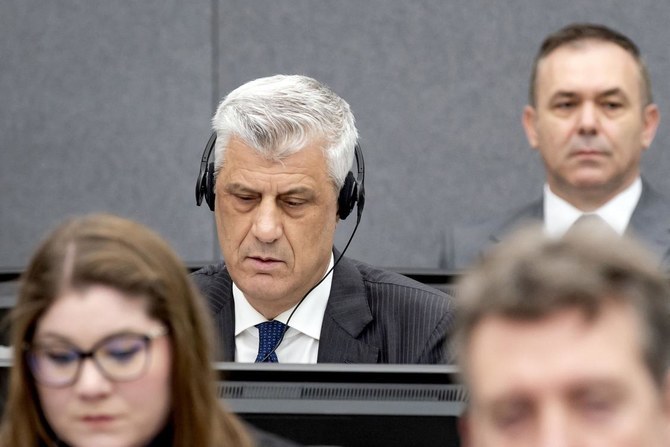
- Prosecutors have asked that all visits be restricted except those from family members which will be recorded
- The restrictions are necessary to prevent any attempts to interfere with witnesses, obstruct or leak their testimony
Iraqi people smuggler who sent thousands across English Channel tracked down by BBC

- A BBC report released on Friday revealed how the organization tracked Majeed down and carried an interview with the fugitive
LONDON: A crime boss wanted in several countries for his role in the smuggling of an estimated 10,000 migrants across the English Channel has been tracked down, according to reports in the British media.
Iraqi Kurd Barzan Kamal Majeed, nicknamed “Scorpion” because of his WhatsApp avatar, had been missing since failing to appear in court in Belgium for a sentencing hearing in November 2022.
The UK’s National Crime Agency issued a warrant for his arrest that same year. Majeed had moved to the British city of Nottingham in 2013, but had been deported two years later.
A BBC report released on Friday revealed how the organization tracked Majeed down and carried an interview with the fugitive.
Rob Lawrie, a former soldier who now works with refugee support agencies, assisted the investigation, which tracked Majeed to his home in the Kurdistan city of Sulaymaniyah, close to the border with Iran.
During the interview, Majeed said he had lost count of the number of people he had helped smuggle and admitted that between 2016 and 2019 he was one of two people running a people-smuggling operation in Belgium and France.
However, he denied being the boss of the operation, adding: “A couple of people, when they get arrested, they say: ‘We’re working for him.’ They want to get less (of a) sentence.”
Majeed’s accomplice, Nzar Jabar Mohamad, was given a 10-year prison sentence at a British court in Oct. 2021 after admitting to attempting to bring 21 migrants into the UK.
He also denied culpability for the death of migrants who attempted the crossing, claiming he was merely a “money man” who “just took the money and booked places.” He added: “I never put anybody in a boat and I never killed anybody. Nobody forced them. They wanted to, they were begging the smugglers: ‘Please, please do this for us.’”
His profits from the operation, with some estimates putting the price of a crossing at £6,000 ($7,514) per person, enabled Majeed to purchase a villa in Marmaris in Turkiye, according to the local police
According to government figures, more than 9,000 migrants have crossed the English Channel in small boats so far this year, a 15-percent rise on the same period in 2022, which was a record-breaking year in which more than 45,700 migrants arrived.
In his interview with the BBC, Majeed claimed that some of his former co-smugglers were still operating today and that a few had even been granted British passports.
“In three days, one guy sent 170 or 180 people from Turkey to Italy, still holding a British passport. I want to go to some other country to do business. I can’t.”
Ann Lukowiak, a public prosecutor in Belgium who was part of the team that worked on convicting Scorpion, told the BBC she still hopes Majeed will be extradited from Iraq to face justice one day.
“It’s important to us to have sent the signal that you can’t do what you want,” she said. “We will eventually take him down.”
Modi critic joins India’s election campaign on bail

- Top court allows Delhi Chief Minister Arvind Kejriwal to leave custody until June 1
- His release is expected to give a boost to India’s opposition alliance in ongoing polls
NEW DELHI: Delhi Chief Minister Arvind Kejriwal joined India’s ongoing general election — boosting the opposition alliance on Saturday — a day after the Supreme Court ordered his temporary release on bail in a controversial graft case.
A fierce critic of Prime Minister Narendra Modi and the leader of the Aam Aadmi Party, Kejriwal was arrested in late March, in connection with corruption allegations related to the excise policy of the Delhi government led by him. He denies the accusations.
On Friday, the top court granted Kejriwal 21-day interim bail to campaign in the seven-phase general vote, which started on April 19. He has to surrender after the last day of voting on June 1.
“I will go around the country in the next 21 days to stop this dictatorship of Modi,” Kejriwal said at a conference in Delhi.
“After June 4, there will be no Modi government. In all states, their seats are going down and they will not get more than 220 to 230 seats.”
The results of the world’s largest election are set to be announced on June 4. The party or coalition that wins at least 272 of the 543 contested seats in the lower house of parliament will form the government.
Seeking a third straight term in office, Modi has been targeting 400 seats for the National Democratic Alliance led by his Hindu nationalist Bharatiya Janata Party, which has been in power since 2014.
He is challenged by an alliance of two dozen opposition parties, the Indian National Developmental Inclusive Alliance, or INDIA, of which Kejriwal’s AAP is a part.
Kejriwal has accused Modi and his BJP of damaging democracy, and abusing power and the constitution.
“The opposition’s morale will get a further boost,” said Satish Kumar Singh, a political analyst in Delhi.
“The release of Kejriwal further reinforces the opposition campaign on the need to save democracy and maintain fairness in the electoral process.”
Kejriwal’s AAP is a challenger to the BJP in Delhi and Punjab, where voting will take place on May 25 and June 1 respectively.
“Kejriwal’s release is a boost to the cadres of the AAP and the opposition alliance at this crucial time when the opposition alliance is challenging the dominance of the BJP in the capital city,” Andalib Akhtar, a New Delhi-based commentator and editor of The Indian Awaz, told Arab News.
“It’s good that the court has taken a decision in favor of democracy and is giving the opposition leader — who was arrested just on the eve of the general elections — an opportunity to be on an equal footing democratically.”
Saudi eye surgeons help 1,000 Sri Lankans regain sight

- KSrelief team consists of doctors from Saudi Arabia and Pakistan
- Untreated cataracts are the most common cause of blindness in Sri Lanka
COLOMBO: A Saudi eye surgeon team is helping 1,000 people in Sri Lanka regain sight with interventions facilitated by the King Salman Humanitarian Aid and Relief Center.
KSrelief’s Saudi Noor Volunteer Program to Combat Blindness started in the city of Kattankudy on Sri Lanka’s eastern coast on May 5 and will run through next week.
“This is a special program to combat blindness among patients who are suffering from a cataract,” M.S.M. Thassim, director general of KSrelief’s local partner, the Association of Muslim Youth of Sailan, told Arab News.
“From the total of 1,000 patients, 500 completed surgery and 500 more (surgeries) will be performed by May 16.”
Cataracts are the most common cause of blindness in Sri Lanka. Surgery to remove them is common, but government programs often require years of waiting. At private clinics, the cheapest lens replacement procedure costs about $300 — too expensive for many patients in poorer parts of the country.
“Cataracts are becoming a problem among the lower-middle class above the age of 40,” Thassim said.
“We perform cataract surgery and also give post-surgery treatment. The patients are from all parts of the island.”
The procedures are free of cost and conducted at the Kattankudy Base Hospital by Sri Lankan medics and six Saudi and Pakistani surgeons from KSrelief’s team.
One of the Saudi volunteers is Dr. Ehab Al-Sirhy, an eye surgeon from King Saud University Medical City in Riyadh.
“The amount of surgery done is an amazing number in such a short period,” he told Arab News, praising local hospital staff for their “excellent logistics and support.”
The medical campaign is part of KSrelief’s longstanding efforts to combat blindness in developing countries. Last year, the center’s team also visited Kattankudy and helped restore the vision of hundreds of patients.
“The results are very encouraging, so now everyone brings their friends and relatives, their grandmothers, their grandfathers,” Al-Sirhy said. “The (campaign’s) reputation is excellent.”
Russia claims more advances after Ukraine ground offensive

- Russia’s defense ministry said its troops had ‘liberated’ five border villages in the Kharkiv region
- The Kharkiv region has been mostly under Ukrainian control since September 2022
UKRAINE: Russia on Saturday said it had captured six villages in Ukraine’s east after launching a surprise ground offensive that prompted mass evacuations.
The defense ministry said its troops had “liberated” five villages in the Kharkiv region near the border with Russia — Borisivka, Ogirtseve, Pletenivka, Pylna and Strilecha — “as a result of offensive actions.”
The village of Keramik in the Donetsk region was also now under Russian control, it said.
Ukrainian officials said Russian forces made small advances in the area it was pushed back from nearly two years ago, the latest in a series of gains as Ukrainian forces find themselves outgunned and outmanned.
“A total of 1,775 people have been evacuated,” Kharkiv governor Oleg Synegubov wrote on social media.
He reported Russian artillery and mortar attacks on 30 settlements over the past 24 hours.
Groups of people could be seen coming in vans and cars with as many bags as they could carry at an evacuation arrival point outside the city of Kharkiv.
Evacuees — many of them elderly — registered and received food and medical assistance in makeshift tents.
“We must disrupt Russian offensive operations and return the initiative to Ukraine,” Ukrainian President Volodymyr Zelensky said on Saturday.
Ukrainska Pravda quoted military sources saying the Russian assault had resumed on Saturday near the village of Glyboke in Kharkiv.
The report could not be independently verified.

The Kharkiv region has been mostly under Ukrainian control since September 2022.
A senior Ukrainian military source said on Friday that Russian forces had advanced one kilometer into Ukraine and were trying to “create a buffer zone” in the Kharkiv and neighboring Sumy regions to prevent attacks on Russian territory.
Ukrainian forces have multiplied attacks inside Russia and Russian-held areas of Ukraine, particularly on energy infrastructure.
Moscow-installed authorities in the Russian-occupied Lugansk region in eastern Ukraine said four people were killed by a Ukrainian strike with US-made missiles on an oil depot in Rovenky.
Governor Leonid Pasechnik said the strike “enveloped the oil depot in fire and damaged surrounding homes.”
In Russia, two people were reported killed by Ukrainian strikes in the Belgorod and Kursk regions.
Ukrainian officials also reported a total of six civilians killed in Russian shelling in the Donetsk, Kharkiv and Kherson regions over the past day.
Officials in Kyiv had warned for weeks that Moscow might try to attack its northeastern border regions, pressing its advantage as Ukraine struggles with delays in Western aid and manpower shortages.
Ukraine’s military said it had deployed more troops and Zelensky said Ukrainian forces were using artillery and drones to thwart the Russian advance.
“Reserve units have been deployed to strengthen the defense in this area of the front,” it said.
The US-based Institute for the Study of War said on Friday that Russia had made “tactically significant gains.”
But the main aim of the operation was “drawing Ukrainian manpower and material from other critical sectors of the front in eastern Ukraine,” it said.
ISW said it did not appear to be “a large-scale sweeping offensive operation to envelop, encircle and seize Kharkiv” — Ukraine’s second biggest city.
Washington announced a new $400 million military aid package for Kyiv hours after the offensive began, and said it was confident Ukraine could repel any fresh Russian campaign.
Heavy rains set off flash floods in northern Afghanistan, killing at least 200 people: UN report says

ISLAMABAD: Flash floods from seasonal rains in Baghlan province in northern Afghanistan killed at least 200 people on Friday, UN report said.
The floods also caused losses to homes and property in several districts, according to Edayatullah Hamdard, the provincial director of Natural Disaster Management in Baghlan. He said that the death toll was preliminary and that it “might rise as many people are missing.”
The flash floods also hit the capital, Kabul, said Abdullah Janan Saiq, the Taliban’s spokesman for the State Ministry for Natural Disaster Management. He said that rescue teams bringing food and other aid have been dispatched to the affected areas.
Saiq said that the rescue operation is the main focus of authorities at the moment, and that he later might be able to provide more precise figures on casualties and damage.
Emergency personnel were “searching for any possible victims under the mud and rubble, with the help of security forces from the national army and police,” Hamdard said earlier.
Dozens of tents, blankets and food were provided to those who lost their homes, he added.
Video footage seen on social media showed huge torrents of muddy water swamping roads and bodies shrouded in white and black cloth.
In one video clip, children are heard crying and a group of men are looking at floodwaters, in which bits of broken wood and debris from homes can be seen.
Since mid-April, flash flooding and other floods have left about 100 people dead in 10 of Afghanistan’s provinces, with no region entirely spared, according to authorities.
Farmland has been swamped in a country where 80 percent of the more than 40 million people depend on agriculture to survive.
Rains on Friday also caused heavy damages in northeastern Badakhshan province and central Ghor province, officials said.
Taliban government spokesman Zabihullah Mujahid said authorities would provide support to those impacted by the flooding across the country.
The government “expresses its deep sympathy with the families of dead and wounded, and instructs the ministry of natural disaster management, ministries of defense and interior, and provincial authorities to spare no resource in rescue efforts,” he said in a statement on X, formerly Twitter.
Mohammad Akram Akbari, the provincial director of natural disaster management in Badakhshan, said the mountainous province had seen “heavy financial losses in several areas... due to floods.”
He added that casualties were feared in Tishkan district, where flooding had blocked a road and cut off access to an area where some 20,000 people lived.
Afghanistan — which had a relatively dry winter, making it more difficult for the soil to absorb rainfall — is highly vulnerable to climate change.
In April, at least 70 people died from heavy rains and flash flooding in the country. About 2,000 homes, three mosques, and four schools were damaged last month. Thousands of people require humanitarian assistance. The flooding also damaged agriculture land and 2,500 animals died in the deluges, according to Saiq.
The nation, ravaged by four decades of war, is one of the poorest in the world and, according to scientists, one of the worst prepared to face the consequences of global warming.
Afghanistan, which is responsible for only 0.06 percent of the world’s greenhouse gas emissions, ranks sixth on the list of countries most at risk from climate change, experts say.
Half of Afghanistan’s population lives under the poverty line, and 15 million people are experiencing food insecurity, according to the World Bank.



